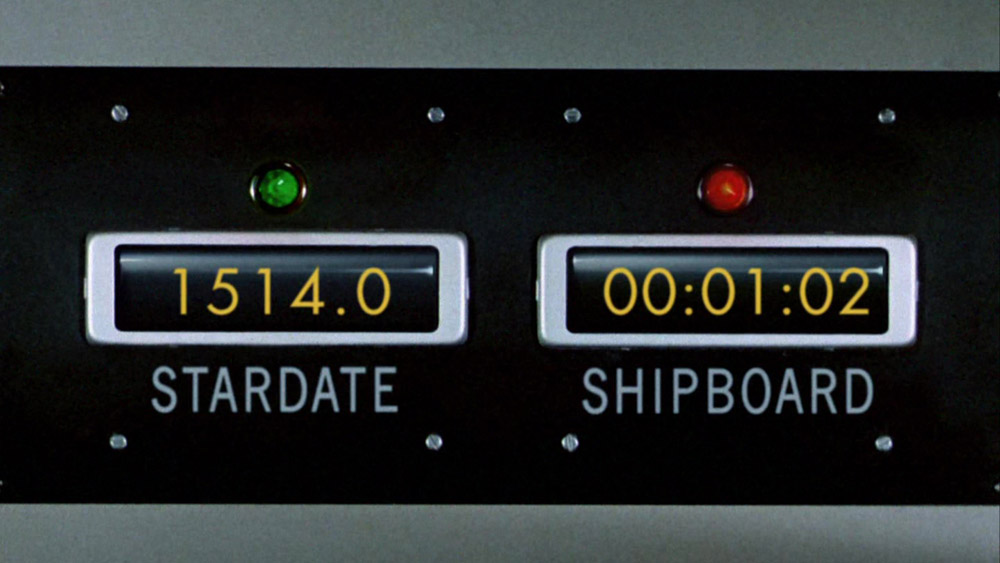Difference between revisions of "time"
m |
m |
||
| (5 intermediate revisions by the same user not shown) | |||
| Line 1: | Line 1: | ||
| − | {{ImageInfoBox2|name=time|file=chronometer-tos02.jpg|caption=A [[chronometer]] ( | + | {{ImageInfoBox2|name=time|file=chronometer-tos02.jpg|caption=A [[chronometer]] ({{TOS03}})}} |
| − | {{ | + | {{First|{{TOS06}} ({{date|Production|1966|9|8}})}} |
| + | {{Ad|AmazonTOSBD}} | ||
|}</div> | |}</div> | ||
| − | + | {{banner|Prime}} | |
==Second== | ==Second== | ||
| − | A second was a measure of time, and the baseline of [[Humans|Human]] time measurements.<ref name=" | + | A second was a measure of time, and the baseline of [[Humans|Human]] time measurements.<ref name="TOS02"/> |
| − | + | {{Wikipedia|Second}} | |
==Minute== | ==Minute== | ||
| − | A minute consisted of sixty seconds.<ref name=" | + | A minute consisted of sixty seconds.<ref name="TOS02"/> On [[Stardate]] [[2266#SD1514|1514.0]], [[Balok]] issued an ultimatum, stating that the [[U.S.S. Enterprise NCC-1701|U.S.S. ''Enterprise'' NCC-1701]] would be destroyed, and that he was granting "ten Earth time periods known as minutes to make preparations."<ref name="TOS03"/> |
| − | < | + | {{Wikipedia|Minute}} |
| + | |||
| + | ==Cycle== | ||
| + | A cycle was a [[Romulans|Romulan]] unit of time, roughly equivalent to a minute.<ref name="TOS09"/> | ||
==Hour== | ==Hour== | ||
| − | An hour consisted of sixty minutes.<ref name=" | + | An hour consisted of sixty minutes.<ref name="TOS02"/> |
| − | + | {{Wikipedia|Hour}} | |
==Day== | ==Day== | ||
| − | A day was the amount of time that it took a planet to complete a rotation on its axis. On [[Earth]], a day was 24 hours long.<ref name=" | + | A day was the amount of time that it took a planet to complete a rotation on its axis. On [[Earth]], a day was 24 hours long.<ref name="TOS02"/> |
| − | + | {{Wikipedia|Day}} | |
==Year== | ==Year== | ||
| − | A year was the amount of time that it takes for a planet to complete a [[orbit|revolution]] around its parent star. One year on [[Earth]] was 365 days,<ref name=" | + | A year was the amount of time that it takes for a planet to complete a [[orbit|revolution]] around its parent star. One year on [[Earth]] was 365 days,<ref name="TOS02"/> and was used as the basis for a year of the [[Stardate]] system introduced in [[2322]].<ref name="TNG1"/> |
| − | < | + | {{Wikipedia|Year}} |
| + | |||
| + | ==Century== | ||
| + | A century was 100 years.<ref name="TOS10"/> | ||
{{References}} | {{References}} | ||
<references> | <references> | ||
| − | |||
<ref name="TOS02">{{RefTOS02}}</ref> | <ref name="TOS02">{{RefTOS02}}</ref> | ||
| + | <ref name="TOS03">{{RefTOS03}}</ref> | ||
| + | <ref name="TOS09">{{RefTOS09}}</ref> | ||
| + | <ref name="TOS10">{{RefTOS10}}</ref> | ||
<ref name="TNG1">{{RefTNG1}}</ref> | <ref name="TNG1">{{RefTNG1}}</ref> | ||
</references> | </references> | ||
Latest revision as of 12:49, 9 July 2023
Second
A second was a measure of time, and the baseline of Human time measurements.[1]
Minute
A minute consisted of sixty seconds.[1] On Stardate 1514.0, Balok issued an ultimatum, stating that the U.S.S. Enterprise NCC-1701 would be destroyed, and that he was granting "ten Earth time periods known as minutes to make preparations."[2]
Cycle
A cycle was a Romulan unit of time, roughly equivalent to a minute.[3]
Hour
An hour consisted of sixty minutes.[1]
Day
A day was the amount of time that it took a planet to complete a rotation on its axis. On Earth, a day was 24 hours long.[1]
Year
A year was the amount of time that it takes for a planet to complete a revolution around its parent star. One year on Earth was 365 days,[1] and was used as the basis for a year of the Stardate system introduced in 2322.[4]
Century
A century was 100 years.[5]
Notes and References
- ↑ 1.0 1.1 1.2 1.3 1.4 Roddenberry, Gene (Executive Producer). "Where No Man Has Gone Before". Star Trek, season 1, episode 3 (Production number 02). Directed by James Goldstone. Written by Samuel A. Peeples. Desilu Productions. 22 September 1966.
- ↑ Roddenberry, Gene (Executive Producer). "The Corbomite Maneuver". Star Trek, season 1, episode 10 (Production number 03). Directed by Joseph Sargent. Written by Jerry Sohl. Desilu Productions. 10 November 1966.
- ↑ Roddenberry, Gene (Executive Producer). "Balance of Terror". Star Trek, season 1, episode 14 (Production number 09). Directed by Vincent McEveety. Written by Paul Schneider. Desilu Productions. 15 December 1966.
- ↑ Roddenberry, Gene (Executive Producer). Star Trek: The Next Generation, season 1. Co-Executive Producers: Rick Berman & Maurice Hurley. Paramount Pictures. 1987-1988.
- ↑ Roddenberry, Gene (Executive Producer). "What Are Little Girls Made Of?". Star Trek, season 1, episode 7 (Production number 10). Directed by James Goldstone. Written by Robert Bloch. Desilu Productions. 20 October 1966.

